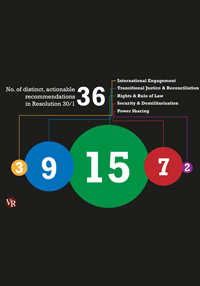This is Verité Research’s latest study on the Sri Lankan government’s commitments on reconciliation and accountability. The ongoing UNHRC Session began on 26 February 2018, and will include a discussion on Sri Lanka’s progress in this regard. This report analyses the government’s progress in fulfilling all 36 commitments made inUNHRC Resolution 30/1, as at 26 February 2018.
This study presents a review of the topics relevant to the debate on private sector participation in tertiary education. These include: the structure of the tertiary education sector; the legislation underlying the establishment of tertiary education establishments; and the current quality assurance and accreditation procedures for tertiary education institutions.
The original version of this report was commissioned by the Westminster Foundation for Democracy to assist in its work in Sri Lanka with the Sri Lankan parliament and political parties. The opinions expressed and contents of this report are not necessarily those held by Westminster Foundation for Democracy. The report was prepared by the politics research practice at Verité Research with Charudaththa Ekanayake functioning as principal researcher under the overall editorial supervision of Janeen Fernando.
Sri Lanka’s exports are heavily concentrated on a few markets and a few products. The government’s recognition of export diversification as an important policy strategy to revive exports, indicates that both market and product concentration are seen as critical bottlenecks in this regard. This report compares and contrasts Sri Lanka’s export product and market concentration and its export composition against that of the world and selected Asian economies. The objective of this brief analysis is to understand where Sri Lanka stands in the world and in comparison to its neighbours that have performed well in terms of export concentration and composition.
Criminal justice institutions re-victimise children. This report details the legal and institutional challenges impeding justice for children in Sri Lanka. The report also details specific recommendations to divert children away from the justice system, and prevent institutionalisation being a matter of first resort.
The report Right to Information: Discourse and Compliance in Sri Lanka was compiled in collaboration between Verité Research and Democracy Reporting International (DRI). Verité Research analysed the right to information in the Sri Lankan context while Democracy Reporting International detailed international best practices relating to proactive disclosure. The study examines the drafting of Sri Lanka’s RTI Act and existing laws that are inconsistent with its provisions. It recommends strategies to strengthen proactive disclosure of information, and to amend laws inconsistent with the RTI Act.
This briefing note is Verité Research’s latest study on the Sri Lankan government’s commitments on reconciliation and accountability. It assesses progress in the fulfillment of 36 commitments made in UNHRC Resolution 30/1, co-sponsored by Sri Lanka in September 2015.
In the recent past, Sri Lanka has focused on negotiating Free Trade Agreements (FTAs) as a means to revive its export sector. FTAs address external barriers that Sri Lankan exporters face in the importing country. However, trade barriers are found not only at the border of the importing country, but also at the border of the exporting country. Using agriculture products as case studies, this study identifies such domestic barriers. Findings reveal that domestic barriers to trade significantly undermine the export capacity and competitiveness of Sri Lankan exports. Hence, addressing them is important to unleash the country’s export potential.
Public procurement is a key instrument through which governments deliver important social and economic goods to citizens. Efficient and accountable public procurement enables better utilisation of public funds, and in better public goods and services. Strengthening public procurement in Sri Lanka requires enhancing its efficiency, cost-effectiveness and competitiveness. E-procurement offers the government major efficiency gains, cost-savings, higher value for money and better fiscal management.







